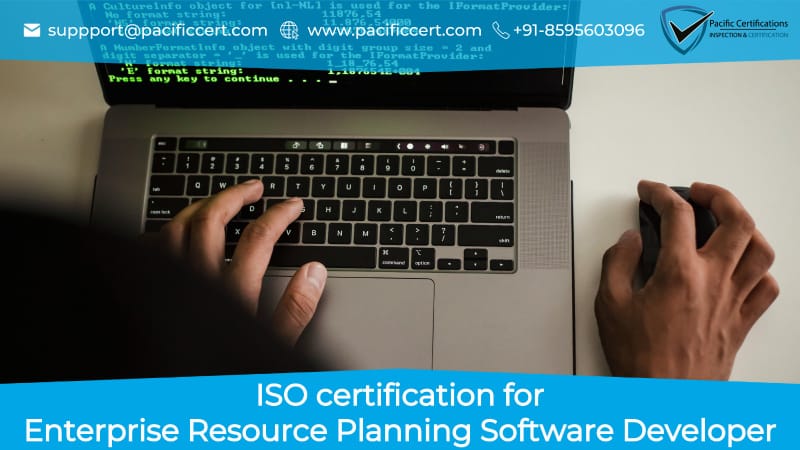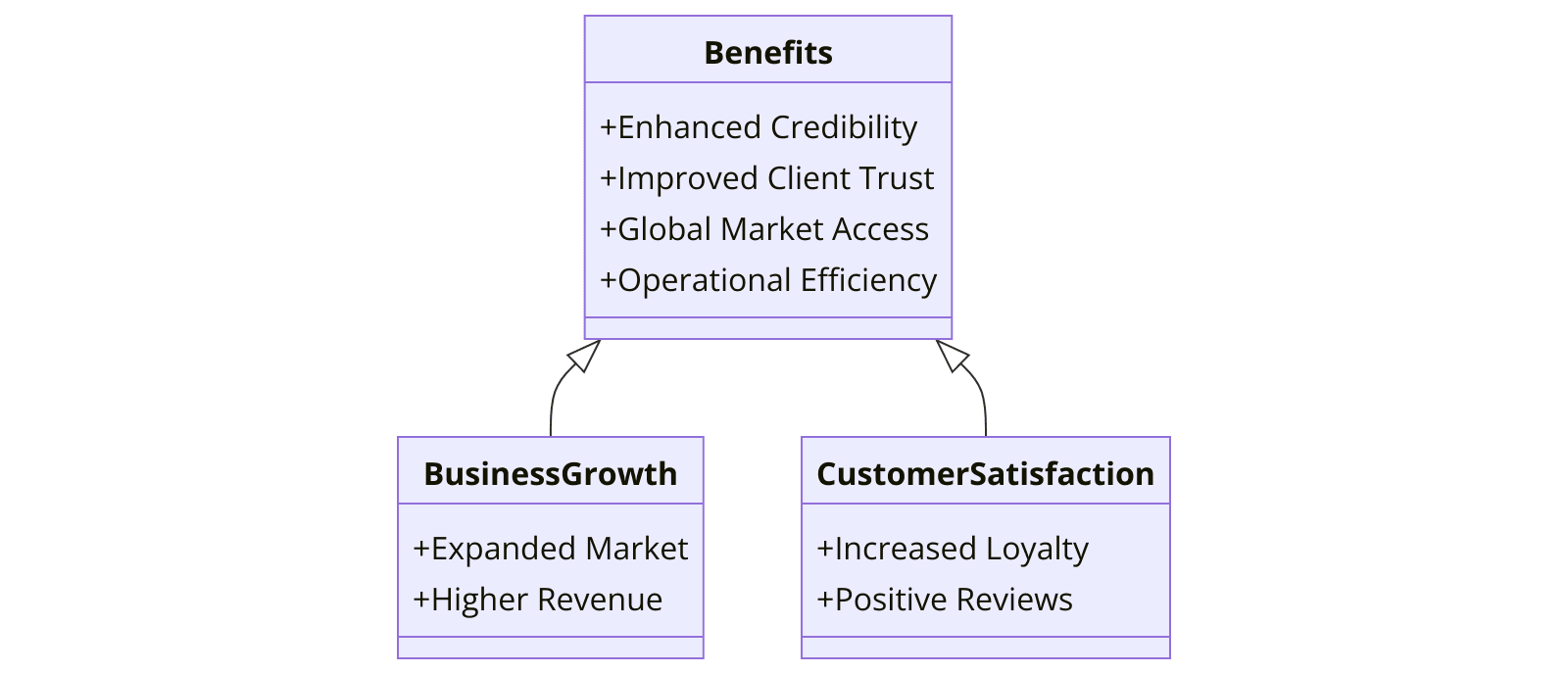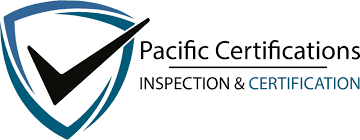ISO Certifications for Enterprise Resource Planning Software Developer Services, Requirements and Benefits

Introduction
Enterprise Resource Planning (ERP) systems serve as the foundation for today’s organizations by bringing together finance, supply chain, human resources, and customer data into a single, unified platform. As businesses increasingly rely on ERP developers to provide software that is secure, efficient, and compliant, certifications based on international standards have become a key indicator of trustworthiness and technical expertise.
According to Gartner’s 2024 ERP Market Report, global ERP software revenue exceeded USD 60 billion, driven by demand for cloud-based, AI-enabled, and compliant systems. Clients increasingly prefer ERP vendors certified to ISO standards for data protection, quality assurance, and service reliability.
“ERP software runs the heart of a business. ISO certifications ensure that heart beats securely, efficiently, and consistently.” — Pacific Certifications
At Pacific Certifications we help ERP firms to achieve their certification goals effectively, for more information, contact us at [email protected].
Quick Summary
ISO certifications help ERP software development companies improve product quality, secure client data, and ensure reliable delivery of enterprise solutions. These certifications validate that development and support processes meet international standards for security, reliability, service continuity, and governance.
Applicable ISO Standards for ERP Software Developers
Several ISO standards are relevant to ERP software development services. These standards address critical aspects of software development, including quality management, information security, and risk management. Below are some of the most important ISO certifications for ERP software developers:
ISO 9001: Quality Management Systems (QMS)
ISO 9001 is one of the most widely recognized standards for quality management. For ERP software developers, this certification focuses on improving overall product and service quality by implementing a structured approach to project management, customer satisfaction and continuous improvement.
ISO/IEC 27001: Information Security Management Systems (ISMS)
ISO/IEC 27001 provides a framework for improving information security management. For ERP software developers, ISO/IEC 27001 certification helps to assure clients that their systems adhere to the highest standards of information security, reducing the risk of data breaches and ensuring compliance with data protection regulations.
ISO/IEC 20000: IT Service Management (ITSM)
ISO/IEC 20000 is the international standard for IT service management. This certification is particularly relevant for ERP developers who offer SaaS (Software as a Service) ERP solutions. ISO/IEC 20000 outlines best practices for delivering effective and efficient IT services that align with business needs.
ISO 22301: Business Continuity Management (BCM)
ISO 22301 helps ERP developers establish a framework for maintaining business continuity in the event of disruptions such as cyber-attacks, natural disasters or hardware failures.
ISO 31000: Risk Management
For ERP software developers, managing risks associated with software development, data management and customer operations is critical. ISO 31000 provides a framework for identifying, assessing, and managing risks across all aspects of the software development lifecycle.
ISO/IEC 12207: Systems and Software Engineering
For ERP developers, ISO/IEC 12207 is a key standard that defines the processes required for software lifecycle management. This standard provides a comprehensive approach to planning, managing, and executing software development projects.
Click here to find out more applicable standards to your industry
What are the requirements of ISO Certifications for ERP Software Developers?
Implementing ISO standards for ERP software development requires a structured and documented approach across quality, security, and risk domains. Each step ensures the organization’s processes align with international best practices. Below are the general requirements:
Establish clear quality, information security, and service management policies that guide ERP development, testing, and deployment activities.
Identify operational, cybersecurity, and business continuity risks, implementing proactive controls to minimize potential disruptions.
Maintain detailed documentation of SDLC processes, data handling, backup procedures, and change management for full audit transparency.
Implement technical and administrative safeguards to prevent unauthorized access and ensure source code integrity.
Provide regular training for developers, project managers, and support engineers to ensure awareness and alignment with ISO requirements.
Conduct periodic internal audits and management reviews to evaluate performance, identify non-conformities, and plan corrective actions.
Develop tested procedures for incident response, disaster recovery, and business continuity to maintain system availability.
Complete Stage 1 (documentation) and Stage 2 (implementation) audits through an ISO/IEC 17021-accredited certification body
What are the benefits of ISO Certifications for ERP Software Developers?
ISO certifications deliver measurable improvements in development quality, client confidence, and regulatory compliance. They also reduce risks, strengthen brand reputation, and support entry into global enterprise markets. Below are some benefits:
Standardizes development, testing, and deployment for consistent software quality.
Implements structured controls for protecting client and user data.
Aligns with GDPR, SOC 2, and other data protection requirements.
Builds trust with enterprise clients and public sector organizations.
Reduces project delays and improves code quality through defined processes.
Ensures service availability and recovery during system outages or cyber incidents.
Strengthens eligibility for government or high-value ERP contracts.
Promotes continuous improvement and adaptability to emerging technologies.
The ERP software sector is expected to grow at a CAGR of 9.3% through 2030, driven by AI-driven analytics, data compliance, and hybrid cloud adoption. Studies from IDC and Deloitte show that more than 65% of ERP clients now require ISO 27001 or ISO 9001 certification as a contractual prerequisite for vendors.
With increasing data privacy laws across the US, EU, and Asia-Pacific, ERP developers are also adopting ISO/IEC 27018 and ISO 22301 to assure resilience and compliance. Companies integrating quality, security, and continuity systems report up to 35% reduction in project risks and 25% faster deployment timelines.
If you're an ERP software developer looking to gain these benefits through ISO certifications, contact [email protected]for certification and auditing services.
How Pacific Certifications Can Help
Pacific Certifications provides independent certification and auditing for ERP software developers globally.
Our Expertise Includes:
Certification for ISO 9001, ISO/IEC 27001, ISO/IEC 20000-1, ISO 22301 & ISO 31000.
Experience with ERP vendors, SaaS providers, and IT integrators.
Remote and onsite audit capabilities worldwide.
Three-year certificate validity with annual surveillance audits.
Why Choose Pacific Certifications?
Accredited and internationally recognized certification body.
Auditors experienced in ERP lifecycle and data security frameworks.
Transparent, efficient audit process and clear communication.
Trusted by IT and technology companies in 150+ countries.
If you need support with ISO certification for your ERP business, please contact us at [email protected] or +91-8595603096.
FAQs - ISO Certifications for Enterprise Resource Planning Software Developer
What is ISO 9001 certification, and why is it important for ERP developers?
ISO 9001 focuses on quality management, ensuring that ERP developers implement effective processes to meet customer needs and improve product quality. It enhances credibility and client satisfaction.
How does ISO/IEC 27001 benefit ERP developers?
ISO/IEC 27001 helps ERP developers establish strong information security management systems, reducing the risk of data breaches and ensuring compliance with security regulations.
What are the key requirements for ISO 22301 certification?
ISO 22301 requires ERP developers to create business continuity plans, conduct risk assessments, and implement strategies for managing disruptions such as system failures or cyber-attacks.
How can ISO/IEC 20000 improve ERP development services?
ISO/IEC 20000 ensures that ERP developers follow best practices for IT service management, improving service delivery, reliability, and customer satisfaction.
Why is ISO 31000 important for ERP software development?
ISO 31000 provides a framework for managing risks in software development, helping ERP developers mitigate potential issues and enhance the resilience of their systems.
Can Pacific Certifications help with ISO certification audits for ERP developers?
Yes, we specialize in conducting certification audits
Author: Ashish
